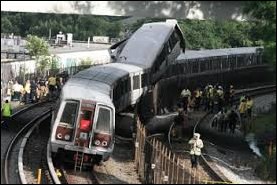Washingtonians are finally showing top-of-mind awareness of the looming pension crisis at the Washington Metropolitan Area Transit Authority. The Metro’s nearly $3 billion in unfunded retirement and health care costs “threaten its future operating position, potentially hampering its ability to provide service,” reports the Washington Post, citing a Government Accountability Organization report.
Coverage of the Metro’s financial condition to date has focused mainly on the political drama associated with finding funding to meet the bus and heavy-rail system’s long-term capital spending needs. Far less attention has been given to the reckless underfunding of the employees’ retirement benefits.
Metro’s annual pension costs grew by an average of nearly 19 percent from 2006 to 2017, the federal report said, making pensions the agency’s fastest-growing workforce cost as its total labor costs grew about 3 percent a year.
With the scale of the obligations, the report posits that in the event of an unfavorable financial market, Metro could be backed into a corner to cover its obligations. The scale of the pension liabilities means that a drop of less than one percentage point in Metro’s investment return on its pension fund could squeeze its operating budget to the point that the agency would need to reduce service or ask the jurisdictions that fund it to cover the shortfall.
“Due to their relative size, proportion of retirees compared to active members, and investment decisions, these pension plans pose significant risk to [the Washington Metropolitan Area Transit Authority’s] financial operations, yet WMATA has not fully assessed the risks,” the GAO concluded. … WMATA may not be prepared for economic scenarios that could increase its required contributions to an extent that might jeopardize its ability to provide some transit service.”
One of the easiest ways ever invented to buy labor peace is to pump up retirement benefits, incurring future liabilities, in exchange for wage moderation today. Metro’s current management does deserve credit for at least trying to address the issue. Leadership tried to engineer a shift from a defined benefit plan to a less expensive defined contribution plan, but an arbitration panel rejected the agency’s proposal last month.
“I’ve been telling you guys this since I became chairman 2½ years ago,” Metro chairman Evans Jack Evans said. “In five to 10 years, the amount of money that we have to pay out of the operating budget to fund the pension will be so high that we won’t be able to run the system.”
Bacon’s bottom line: It is all but pre-ordained that Metro will be back in a few years begging for another bail-out, this time to cover its retirement obligations. Virginians, prepare to open up your pocketbooks yet again for the mass transit system that never stops taking.
By the way, if you think Metro is uniquely irresponsible in its pension policies, think again. Pension underfunding is widespread in governmental and quasi-governmental agencies across Virginia. Virginia Retirement System liabilities of about $20 billion may be the tip of the iceberg. Perhaps Secretary of Finance Aubrey Layne, a voice of fiscal probity, could assign one of his minions to compile a list of all public pension funds in the Commonwealth and tote up their unfunded liabilities.


Leave a Reply
You must be logged in to post a comment.